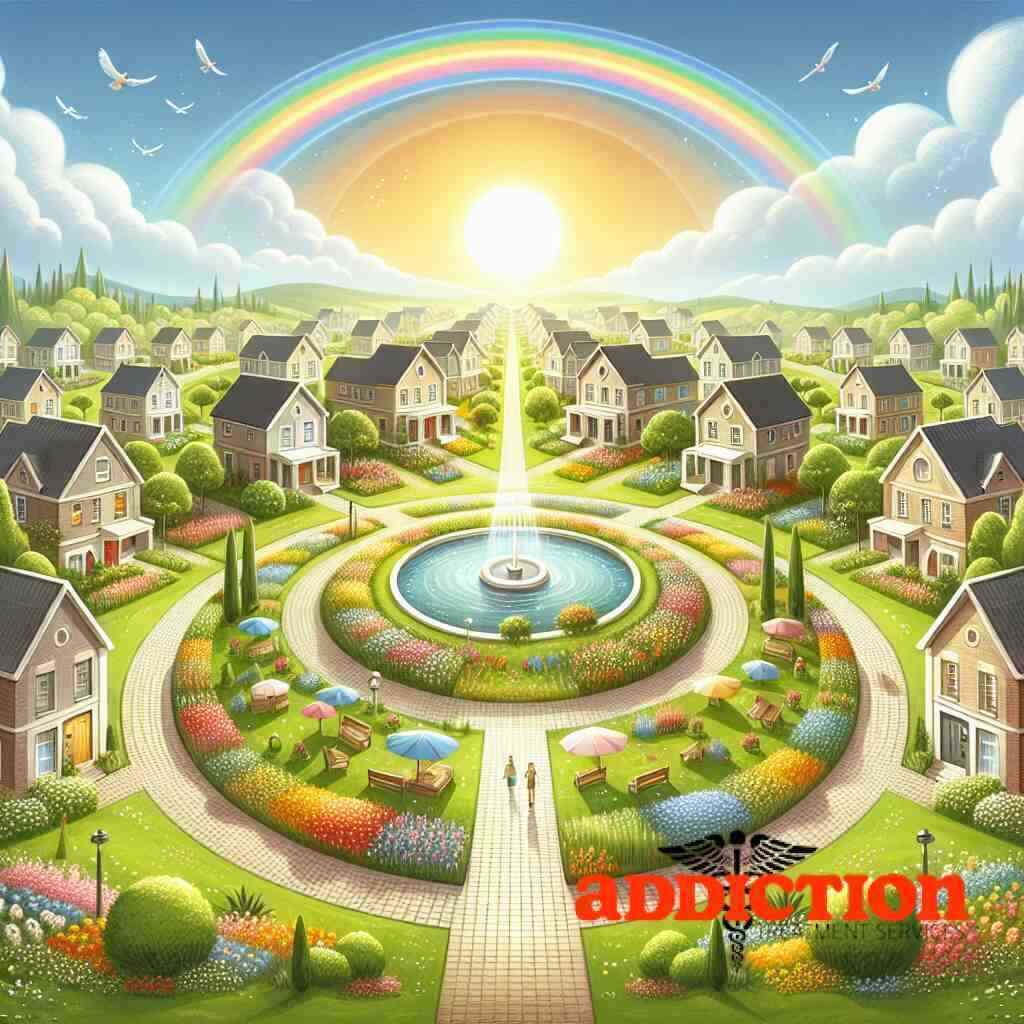 Posted On: 09/19/2024
Posted On: 09/19/2024Introduction to Sober Living
Understanding Sober Living Homes
Sober living homes offer a vital step in the journey towards recovery and lifelong sobriety. These residences provide a safe and supportive environment for individuals who are transitioning from an inpatient treatment facility to mainstream society. Sober living homes bridge the gap between the structured, therapeutic environment of rehab centers and the numerous challenges of the real world. Unlike traditional housing, these facilities establish a substance-free zone that emphasizes the importance of community and accountability. Within these walls, residents work collectively to support one another’s sobriety, adhering to rules and participating in household responsibilities, which reinforces their commitment to recovery. The ultimate goal is not just to abstain from substance use but to build a foundation for a healthy, sober lifestyle.
Benefits of Sober Living
The benefits of sober dwelling extend far beyond simply providing a drug-free environment. First and foremost, they offer stability during a time that can often feel overwhelming. Residents benefit from the communal support of peers who share similar experiences and goals, creating a network of empathy and understanding. This peer support is instrumental in reducing feelings of isolation and loneliness that often accompany the early stages of sobriety. Additionally, sober living homes enforce a structured lifestyle, including regular drug testing, mandatory involvement in recovery meetings, and adherence to house rules, which helps residents develop discipline and accountability. This structured environment fosters the development of healthy habits and routines that are critical for long-term sobriety. Furthermore, many sober living homes provide access to resources for job hunting, financial management, and continuing education, equipping residents with the tools they need to rebuild their lives and reintegrate into society successfully.
The Role of Sober Living in the Recovery Process
The role of sober living in the recovery process cannot be overstated. As individuals progress through their treatment programs, the transition to independent living can present a host of challenges and potential triggers. Sober living homes act as a critical intermediary step, offering a supportive and structured environment that stands as a buffer against the immediate pressures of returning to day-to-day life. This step allows individuals to practice the coping strategies and relapse prevention techniques they have learned in treatment within a less controlled but supportive environment. The integration of regular 12-step meetings and other recovery activities within the sober living setting fosters a sense of community and collective healing, reinforcing the concept that residents are not alone in their journey. Sober living homes also place a significant emphasis on personal responsibility and self-sufficiency, teaching residents to take ownership of their sobriety and well-being. This phase in the recovery process is crucial for testing the waters of independence while still having access to support and guidance, ultimately leading to higher success rates in long-term sobriety and a smoother transition to a fully independent lifestyle.
Finding the Right Sober Living Home
Criteria for Selecting Sober Living Homes
When it comes to choosing a sober living home that meets your needs, several factors should guide your decision-making process. Firstly, location is a key element; finding sober homes close to me ensures ease of access to work, school, or supportive family and friends, which can be integral to your recovery journey. Furthermore, the facility’s reputation and accreditations offer insight into the quality of care and support you can expect.
It is also important to consider the amenities and services provided. A home that aligns with your values and recovery goals, such as offering structural sober living programs, can significantly enhance your recovery experience. Additionally, evaluating the house rules, the level of structure, and the types of recovery programs offered, as well as whether the facility includes 12-step or alternative recovery meetings on-site, is crucial. A visit to the facility and interactions with the staff and current residents can also provide valuable insights into whether the environment feels supportive and positive for your recovery process.
Sober Living Rules and Expectations
Adherence to rules and expectations is the cornerstone of the success and safety of sober living communities. These guidelines, ranging from maintaining sobriety to participating in household chores and meetings, establish a structured environment that supports residents in their recovery journey. Typically, residents are expected to contribute to the community by engaging in daily responsibilities, attending regular house meetings, and respecting curfews.
It is also common for sober living homes to conduct random drug and alcohol screenings to ensure a safe and drug-free environment for all residents. Participation in external recovery or support groups, such as Alcoholics Anonymous or Narcotics Anonymous, may be encouraged or required. Understanding and agreeing to these rules beforehand can significantly impact your readiness and commitment to the program and, ultimately, your recovery progress.
Cost of Sober Living Homes
The cost of sober living homes can vary widely based on location, amenities, and the level of support provided. Generally, residents can expect to pay monthly fees comparable to modest apartment rentals in the area, though some high-end facilities may cost more. It’s crucial to inquire about what is included in the expenses, such as utilities, meals, and transportation services.
Some homes offer sliding scale fees or scholarships for those with financial hardships, and understanding the estimations for sober residence costs upfront can help in budgeting and financial planning for your stay. Discussing payment options and any available financial assistance with the sober living home’s administration can provide clarity and ease the financial aspect of your recovery journey.
Sober Living for Men vs. Sober Living for Women
The experience and needs in recovery can differ significantly between genders, making gender-specific sober living homes an essential consideration. Sober living for men often focuses on issues like masculinity, responsibility, and brotherhood, while sober living for women may address topics such as self-esteem, body image, and independence. Gender-specific homes provide a safe space to discuss and heal from these issues without the distractions or pressures that can arise in co-ed environments.
These homes also tailor their recovery programs and support systems to the unique challenges faced by each gender in recovery, fostering a more comfortable and supportive environment conducive to personal growth and healing. Choosing between sober living for men and women can be pivotal in ensuring the recovery process is as effective and supportive as possible, catering to the specific needs and dynamics of each gender’s recovery journey.
Types of Sober Living Environments
Substance Free Housing
Substance-free housing offers a secure environment for individuals in recovery from addiction. In these settings, the focus is on providing a living space that wholly excludes alcohol and drugs, creating a haven that supports residents’ sobriety goals. This type of housing is instrumental for people freshly transitioning from an inpatient program and requires a foundation free from substances to avoid relapse. By choosing substance-free accommodations, residents become part of a community committed to living a sober lifestyle, where mutual support and understanding form the bedrock of daily life. Moreover, these environments often facilitate access to recovery meetings and other resources essential for maintaining sobriety, emphasizing the critical importance of a supportive community in the recovery journey.
Transitional Living Homes for Addicts
Transitional homes for recovering people with addiction play a pivotal role in the continuum of care, serving as a bridge between intensive treatment settings and full independence. Transitional homes provide a structured yet semi-independent living situation where residents can continue to heal and grow in their recovery journey. These homes offer a structured yet semi-independent living situation where residents can continue to heal and grow in their recovery journey. The emphasis in transitional homes is on helping individuals reintegrate into society by fostering life skills such as employment seeking, financial management, and healthy relationship building, all within the framework of sobriety. Residents benefit from living in an environment that understands the challenges of early recovery and offers a balanced mix of freedom and accountability. Through a combination of peer support, professional guidance, and adherence to a recovery-oriented lifestyle, these homes provide a critical stepping stone back to an independent, substance-free life. Through a combination of peer support, professional guidance, and adherence to a recovery-oriented lifestyle, these homes provide a critical stepping stone back to an independent, substance-free life.
Peer-Supported Sober Living
Peer-supported sober living environments emphasize community and mutual aid among residents. The collaboration in a peer-supported setting is grounded in shared experiences, struggles, and triumphs, fostering a unique sense of belonging and understanding. In these settings, the recovery journey is shared, with all members actively participating in their own and each other’s sobriety. The bond formed in a peer-supported setting is grounded in shared experiences, struggles, and triumphs, fostering a unique sense of belonging and understanding. This collaborative approach to recovery encourages accountability and a collective commitment to maintaining a substance-free lifestyle. Facilities that offer peer-backed sobriety dwellings typically integrate regular group meetings and activities that strengthen the community’s fabric, enhancing the overall efficacy of the recovery process. By living and working together, residents learn to navigate life’s challenges without resorting to substance use, leaning on their peers for support, guidance, and encouragement.
Structured Sober Living Programs
Structured sober living programs provide the most controlled environment, with clearly defined rules, responsibilities, and recovery-oriented activities. These programs are designed to offer a high degree of support and structure, ideal for individuals who benefit from more guidance and less ambiguity in their recovery journey. Residents follow a daily schedule that includes therapy sessions, life skills training, and recovery meetings. This structure helps individuals establish routines and healthy habits that are critical in early sobriety. The disciplined nature of these programs helps mitigate the risk of relapse by keeping residents engaged in their recovery and accountable to their goals. In structured sober living, the transition to an independent, sober life is facilitated by a framework that prioritizes wellness, personal development, and communal support.
Maximizing Your Stay at a Sober Living Home
Integrating into a Sober Community
Successfully integrating into a sober living community involves much more than merely following the rules. It means actively engaging in the new environment and forming meaningful connections with others who are on similar paths. Building these relationships is vital, as they can become a source of strength and support during challenging times. To fully integrate, participate in communal activities, and offer your help to fellow residents. Please share your experiences and listen to theirs; this exchange can foster a sense of belonging and mutual understanding. Remember, the trust and friendships formed within a sober living community can significantly impact your recovery journey, providing both comfort and encouragement as you navigate the path to sobriety.
Engaging in 12-Step Program Housing
Living in a sober home that promotes 12-step program participation can greatly enhance your recovery experience. These programs, including Alcoholics Anonymous and Narcotics Anonymous, provide a structured approach to recovery, emphasizing personal responsibility, spiritual awakening, and community support. Engaging in such programs while residing in a sober living home allows for an immersive recovery experience where one can practice the principles learned in meetings in daily life. Attendance at meetings for Alcoholics Anonymous or Narcotics Anonymous gatherings not only helps solidify your commitment to sobriety but also expands your support network, connecting you with individuals who truly understand the struggles and triumphs of recovery. Participating fully in these programs can offer a profound sense of achievement and a clearer roadmap to long-term sobriety.
Relapse Prevention in a Sober Living Environment
A key component of maximizing your stay in a sober living home is actively engaging in relapse prevention strategies. These environments are designed to support recovery, but individual effort is crucial to leverage this support fully. To prevent relapse, take advantage of the structured schedule and participate in regular therapy sessions or counseling available. Educate yourself on recognizing withdrawal symptoms and the signs of potential relapse. Educate yourself on recognizing withdrawal symptoms and the signs of potential relapse. Utilizing the resources and programs that sober living facilities provide for relapse prevention can significantly increase your chances of maintaining long-term sobriety. Furthermore, involvement in peer support groups within the home can offer additional accountability and encouragement, which are vital for navigating moments of vulnerability.
Post-Treatment Housing Options for Continued Care
Exploring post-treatment housing options is an important step towards independence while still maintaining a support network for your sobriety. As you transition from a sober living home, consider options that continue to offer a level of structure and community involvement, such as supportive living for individuals in recovery available in various locations. As you transition from a sober living home, consider options that continue to offer a level of structure and community involvement, such as supportive living for individuals in recovery available in various locations. These environments can provide a less restrictive but still supportive living situation, perfect for those who have progressed in their recovery but still benefit from a recovery-oriented community. Investigating these options early in your stay at a sober living home can make the transition smoother and less intimidating. Remember, the journey to recovery doesn’t end with sober living; it’s a continuous process that benefits from ongoing support and care.
Conclusion: Taking the Next Steps Towards Recovery
Selecting the Best Sober Living Home Near You
The pivotal journey towards sobriety involves selecting a sober living home that resonates with your healing journey. It’s more than finding a place to stay; it’s about discovering a supportive environment that champions your recovery every step of the way. To locate sober homes close to me, it’s essential to leverage resources like Addiction Treatment Services, which simplify the search process by connecting you with reputable sober living facilities tailored to your specific needs. Consider proximity to supportive services, work or educational opportunities, and a community that aligns with your recovery goals. Engage in discussions with potential homes, ask questions, and ensure their philosophy and structure complement your path to recovery. Remember, the right environment can enhance your motivation and commitment to a sober life.
Building a Foundation for Long-Term Sobriety
Successful long-term sobriety is built on the solid foundation of holistic wellness. This includes physical health through proper nutrition and exercise, emotional well-being with therapy and support groups, and spiritual growth through reflective practices or faith-based activities. In a sober living context, integrating these aspects into your daily life is crucial. Participation in structured programs and community engagements within the home fosters an environment conducive to growth. Additionally, setting personal goals and engaging in ongoing education or vocational training can help redefine your purpose and direction. A commitment to these principles, coupled with the support of a sober living community, lays the groundwork for a fulfilling, sober life.
Resources and Support Services for Sober Living Residents
Beyond the walls of sober living homes, a wealth of resources and support services play an essential role in the recovery journey. Organizations like Addiction Treatment Services provide access to a comprehensive directory of treatment facilities and recovery programs. From meetings for Alcoholics Anonymous to mental wellness centers, these resources offer guidance, education, and community to foster sustained sobriety. Leveraging such resources ensures that individuals in recovery are not alone, offering a safety net through moments of vulnerability or uncertainty. Engaging with community resources, attending regular meetings, and accessing available services can significantly enhance the recovery experience, providing tools and support for managing challenges and celebrating successes on the path to long-term sobriety.
In conclusion, taking the next steps toward recovery involves careful consideration of your sober living environment, a commitment to building a foundation for sobriety, and actively seeking out resources and support services. Through thoughtful selection, dedication to your recovery process, and engagement with the broader recovery community, you can navigate the journey to sobriety with confidence and support. Remember, every step taken towards recovery is a step towards a more healthful, fulfilling life.
Frequently Asked Questions
Question: How do Addiction Treatment Services help in finding sober living homes near me?
Answer: Addiction Treatment Services simplifies the search process for finding sober living homes near you by offering a comprehensive directory of reputable addiction treatment housing options across all 50 states. Whether you’re seeking substance-free housing, a supportive living environment for recovering people with an addiction, or structured sober living programs, our platform provides detailed information and access to a wide array of recovery residences. We understand the unique needs of individuals in recovery and strive to connect you with sober living communities that align with your recovery journey, offering support every step of the way.
Question: What factors should I consider when using your services to select a sober living environment as advised in your “Guide to Selecting Sober Living Homes Near You”?
Answer: When using Addiction Treatment Services to select a sober living environment, consider several key factors to ensure the home aligns with your recovery goals. First, look into the location to ensure accessibility to work, school, or supportive networks. Evaluate the reputation and credentialed status of the home to guarantee a quality recovery environment. Amenities, house rules, and the structure should align with your values, and the cost of the sober living homes should fit within your budget. Additionally, consider whether gender-specific housing, like sober living for men or sober living for women, is more suited to your needs. Our directory and resources are designed to help you make an informed decision, matching you with a sober living community that supports your path to long-term sobriety.
Question: Can Addiction Treatment Services provide information on the cost of sober living homes and any financial assistance options available?
Answer: Yes, Addiction Treatment Services provides detailed information on the cost of sober living homes and various financial assistance options that may be available. Understanding that affordability is a crucial factor for many in recovery; we ensure our directory includes information about the monthly fees, what is included in those costs, and any scholarships or sliding scale fees offered by recovery residences. Our goal is to help you find a drug-free living space that not only meets your recovery needs but also fits within your financial constraints, ensuring the journey to sobriety is accessible to all seeking help.
Question: How does gender-specific housing, like sober living for men or women, enhance the recovery process?
Answer: Gender-specific housing, such as sober living for men or women, enhances the recovery process by addressing the unique challenges and needs that different genders may face during their journey to sobriety. These environments provide a safe space where individuals can freely discuss gender-related issues without the distraction or pressure of a co-ed setting. They tailor recovery programs and support systems to focus on topics such as masculinity, independence, self-esteem, and body image, creating an atmosphere conducive to open communication and understanding. Addiction Treatment Services recognizes the importance of these specialized environments and offers a wide selection of gender-specific sober living options, ensuring residents have the support they need in a comfortable and focused recovery setting.
Question: Are there post-treatment housing options available through Addiction Treatment Services for continued care after leaving a sober living home?
Answer: Absolutely. Addiction Treatment Services provides access to a variety of post-treatment housing options for individuals looking to continue their care after leaving a sober living home. Recognizing that recovery is a continuous journey, we offer information on supportive living situations that provide a balance of independence and community involvement. Whether you’re transitioning from a peer-supported sober living environment or a structured sober living program, our resources can help you find a place that supports sustained sobriety with the right level of structure and community engagement. Exploring these options early ensures a smoother transition and ongoing support for maintaining long-term sobriety.




